
URL Copied
November 1, 2021 9:05 pm
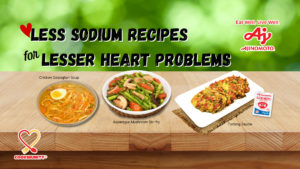
A number of us may have known someone in the family with hypertension. Filipinos commonly call it as “high blood or altapresyon”. When we are too angry, some may jokingly say “high blood ka nanaman or relax ka lang, ang BP mo”. But we actually consider someone as hypertensive when his or her blood pressure reading is greater than or equal to 140/90 mmHg. According to the 2018 Expanded National Nutrition Survey, 16% of Filipino adults have hypertension. This can lead to a serious medical condition that can lead to other complications such as diseases of the heart. Cardiovascular or heart diseases remain as the top causes of death in the country.
There are several causes of high blood pressure. One of this is a diet high in sodium. When we have too much sodium, our bodies tend to hold water to dilute or “wash away” the sodium. This is evident when our feet, hands or other parts of the bodies are swollen, called as “pamamanas”. The increased amount of fluid and blood volume causes a higher pressure in the blood vessels. It’s like putting more water supply in the garden hose, causing high water pressure. When this happens, our heart exerts more effort to pump blood around the body that furthermore causes complications of the heart.
The World Health Organization recommends a less than 2000 mg consumption of sodium per day or equivalent to less than 5 grams or 1 teaspoon of table salt. It includes the sodium we get from our daily diet as well as the added sodium we take in when we eat salty snacks or use too much condiments and seasonings.
But worry not! Reducing sodium in the diet does not mean that we should have tasteless foods on our plates. We have few tips for you to enjoy your food without getting too much sodium on your daily meals:
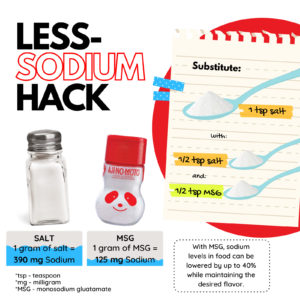
Cookmunity® by Ajinomoto prepared less sodium recipes that will surely be loved by your hearts. Try these three (3) healthy recipes made more delicious with AJI-NO-MOTO® Umami Seasoning. These recipes used MSG to reduce sodium consumption by up to 43 percent.
The first less sodium recipe is very simple. Just like any other torta, Tortang Sayote is quick and easy to prepare. To make this, first, you need to combine sayote, potatoes, bell pepper, onion, garlic and beaten egg in a bowl. Add bread crumbs then season with AJI-NO-MOTO® Umami Seasoning, salt and pepper. Mix it well. In a pan, heat oil, scoop 2-3 tablespoons of the mixture, and fry until golden brown. Repeat the process with the rest of the vegetable mixture. Finally, transfer to a bowl and serve while hot. This recipe has 33% reduced sodium.
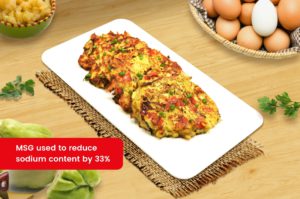
The next recipe sounds new but is surely good for the heart. Try making Asparagus Mushroom Stir-Fry with a reduced sodium content of 43% from its original recipe. Start cooking by creating a slurry, by mixing corn starch and water in a small bowl, then set aside. In a hot pan with oil, sear button and shiitake mushroom until edges turn slightly brown. Add onion, garlic and tomatoes and sauté for 1-2 minutes. Add asparagus and stir-fry for 2-3 minutes. Put slurry, ground black pepper, soy sauce and AJI-NO-MOTO® and cook for another 2-3 minutes. Transfer to a serving platter and garnish with spring onion.
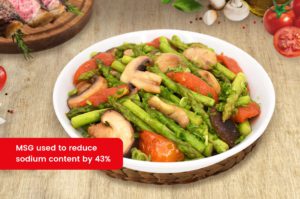
Last but not the least is Chicken Sotanghon Soup with reduced sodium content by 34 percent. To make this hearty soup, heat oil in a pan. Sauté onion and garlic until onions become soft and fragrant. Add celery, chicken and chicken stock, let it boil. Add annatto water and sotanghon noodles, and then cover and simmer for ten (10) minutes. Add carrots and cabbage then cook for another minute. Season with AJI-NO-MOTO®, fish sauce and pepper. Mix well and cook for another minute. Transfer to a serving bowl. Top with toasted garlic and spring onions. Serve and enjoy.
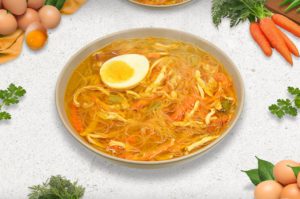
There you have it. Start your less sodium journey in the kitchen with these three (3) recipes that surely won’t bring your taste buds down. A friendly reminder: Do not put all the blame to sodium. There are various causes of hypertension. A diet high in fat and cholesterol, lack of physical activity, and many others also contribute to increased blood pressure. Sodium per se is an essential mineral for our bodily functions and one must not eliminate it in the diet.
Check our Cookmunity® page for more less-sodium recipes!
References:
Philippine Nutrition Facts and Figures. 2018 Expanded National Nutrition Survey. Food and Nutrition Research Institute – Department of Science and Technology
https://www.hsph.harvard.edu/nutritionsource/salt-and-sodium/take-action-on-salt/
https://www.heart.org/en/healthy-living/healthy-eating/eat-smart/sodium/how-to-reduce-sodium